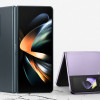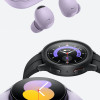Review: Motorola Devour
Screen
The screen on the Motorola Devour seems much smaller than it actually is, thanks to the large black border all around it, and even more aluminum casing surrounding that border. Still, it is the smallest screen I've seen on an Android device, coming in a hair smaller than the screen on the T-Mobile myTouch 3G or T-Mobile G1. The resolution is also a disappointing HVGA, 320 by 480 pixels. For comparison, the Motorola Droid packs 2.5 times the pixels into a display that's just over a half-inch larger, so the Motorola Devour's screen doesn't look nearly as crisp and sharp as its Verizon cousin. Text looked a little jagged at times, and some images suffered from a screen door effect. Icons and menus looked bright and colorful. I also had no trouble using the screen outside on a bright, sunny day, even with brightness dialed down to about 50%.
Signal
Wireless signal strength on the Motorola Devour was unimpressive, and lousy in some cases. Where other Verizon Wireless phones saw 2-3 bars of service, the Motorola Devour would only report a single bar. The phone would also lose contact with the 3G, EV-DO network on occasion and revert to slower 1xRTT, where other phones kept hold of the faster signal. At its lowest points, my calls would still dial out, but incoming calls from my other test phones would not come through on the Devour. Also, downloads from the Verizon Wireless V Cast store and pages loaded on the Android Web browser took a speed hit when signal was poor, and some pages stopped loading entirely.
The Devour also has Wi-Fi, but I had serious trouble making a connection. Though the phone connected properly in my first day of testing, on my second day of trials the Wi-Fi seemed to stop working altogether. It couldn't properly connect to any Wi-Fi network, and I never got a Wi-Fi status indicator in the notification bar, even though the battery usage meter told me that the Wi-Fi radio was a significant drain on the phone's power resources.
Sound
Sound quality on the Motorola Devour was okay, but I've come to expect more from Motorola's devices, which often sound much better than this. My voice sounded a bit muffled on my caller's end, and had a digitally compressed quality to it. On my end, the Devour's earpiece sounded pretty good, with no static problems or drop-outs, but callers still sounded somewhat distant. The speakerphone is clear, but not as abusively loud as I like. I could barely hear the speakerphone in my car over the engine and outside noise while I was driving fast. This wasn't a problem with the ringtones. The phone produced some loud rings, and I could hear it even when it was tossed in a backpack or buried in a coat pocket.
Battery
It seems that Motorola's Motoblur interface is something of a battery hog. While the Droid had exceptional battery life, the Motorola Devour, like the Motorola Cliq, couldn't last as long. In a simple calling test, the Devour fared well. I managed a test call that was 15 minutes shy of seven hours talk time. But in standby mode, the battery drained much faster. I charged the phone fully on Tuesday morning, and before lunch on Wednesday the phone died. Testing GPS navigation and Bluetooth drained the battery even faster, so with heavy use, the Motorola Devour might not make it through a full day's work without a charge.
The phone does have some interesting battery options to help conserve power. You can adjust the performance mode of the phone to save juice. The phone will turn down the display brightness and even disconnect from the 3G data network to prolong the battery life. There's even a battery usage meter to let you know which features and tasks were draining the battery fastest. Not surprisingly, the display and the Wi-Fi radios were the big culprits in my tests, but the phone's standby mode was also a power hog, which is why I blame Motoblur, with its constantly updating social networking features.


 Samsung Refines its Foldable Phones
Samsung Refines its Foldable Phones
 Samsung Upgrades its Wearables
Samsung Upgrades its Wearables
 iPhone 14 Plus Offers a Big Screen For Less
iPhone 14 Plus Offers a Big Screen For Less
 iMovie Makes it Easier to Create Polished Videos
iMovie Makes it Easier to Create Polished Videos
 Google Revamps Android Auto Interface
Google Revamps Android Auto Interface
 Motorola Devour
Motorola Devour








